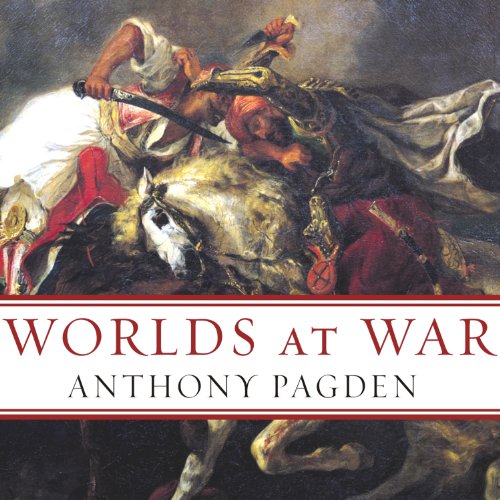
Worlds at War
The 2,500-Year Struggle Between East and West
Failed to add items
Add to Cart failed.
Add to Wish List failed.
Remove from wishlist failed.
Adding to library failed
Follow podcast failed
Unfollow podcast failed
$0.00 for first 30 days
Buy for $21.49
No default payment method selected.
We are sorry. We are not allowed to sell this product with the selected payment method
-
Narrated by:
-
John Lee
-
By:
-
Anthony Pagden
The relationship between East and West has always been one of turmoil. In this historical tour de force, a renowned historian leads us from the world of classical antiquity, through the Dark Ages, to the Crusades, Europe's resurgence, and the dominance of the Ottoman Empire, which almost shattered Europe entirely. Pagden travels from Napoleon in Egypt to Europe's carving up of the finally moribund Ottomans - creating the modern Middle East along the way - and on to the present struggles in Iraq.
Throughout, we learn a tremendous amount about what "East" and "West" were and are, and how it has always been competing worldviews and psychologies, more than religion or power grabs, that have fed the mistrust and violence between East and West. In Pagden's dark but provocative view, this struggle cannot help but go on.
©2008 Anthony Pagden (P)2008 TantorListeners also enjoyed...




















Critic reviews
People who viewed this also viewed...


















Sweeping historical saga
Something went wrong. Please try again in a few minutes.
Good to listen to.
Something went wrong. Please try again in a few minutes.
Unapologetic pitch for secularism
Something went wrong. Please try again in a few minutes.
Great survey of the seeds of discontent
Something went wrong. Please try again in a few minutes.
The beat goes on.
Something went wrong. Please try again in a few minutes.
Very illuminating
Something went wrong. Please try again in a few minutes.
What did you love best about Worlds at War?
A scholarly and riveting book for history fans.Any additional comments?
This book has become one of the 5 audio books that I carry at all times. An interesting subject, well written by the author, and beautifully read by the narator. For those who are interested in the ageless battle between east and west, and how we've come to be where and what we are today, this book is facinating and instructive.One of the best audio books that I own!
Something went wrong. Please try again in a few minutes.
Great start but petered out
Something went wrong. Please try again in a few minutes.
western bias
Something went wrong. Please try again in a few minutes.
It should also be noted that Pagden has a strong bias towards liberal, secular, democratic values, which he feels are the essence of Western culture (he states as much in the forward). Religion, both Christianity and Islam, are portrayed in a dim light, as institutional obstacles to reason, human rights, and progress. Not that I don???t largely agree with this assessment, but some readers might take offense. Still, he seems to be fair-minded about it, giving Muslim societies credit for brief periods of learning and relative tolerance, and indicting the modern West for its more counterproductive forays into the Middle East, which understandably stoked the fires of Muslim distrust and resentment. Indeed, the final chapter warns, convincingly, of continued bloody conflict between an uncompromising pan-Islamic worldview, whose adherents have enjoyed few of the fruits of the West and see little of their value, and countries like the US, whose leaders naively assume that their own democratic attitudes are universally held, and fail to account for a divide with deep historic roots.
However, I don???t want to place too much emphasis on modern politics, which take a back seat to the fact that this is a comprehensive, well-researched history, outlining many episodes over 2,500 years that I was only dimly aware of (e.g. Napoleon???s adventures in Egypt), and pulling them into a readable, continuous narrative. Especially interesting was reading of the ways in which the West???s often-skewed perception of the East as an "other" to strive against has nonetheless shaped its own attitudes towards freedom, tolerance, and science.
Absorbing, well-researched, not unbiased history
Something went wrong. Please try again in a few minutes.



